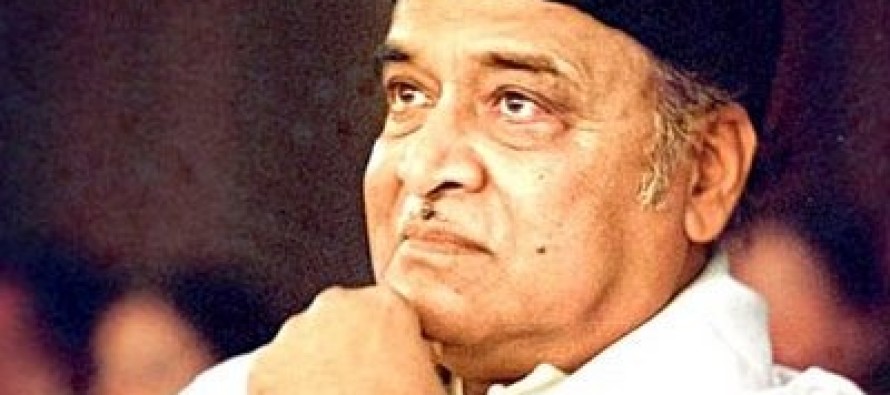Dr Bhupen Hazarika: The Aawara lives on through his songs

GUWAHATI/MUMBAI: His music carried the smell of the dark earth and the hum of the deep rivers he sang so passionately about. Bard and balladeer of the Brahmaputra, Bhupen Hazarika, 85, who passed away owing to multiple organ failure at Mumbai’s Kokilaben Hospital on Saturday, was not only the greatest cultural icon of Assam but also the region’s biggest cultural ambassador.
“He was not just a singer but a social reformer who brought the Northeast closer to the rest of India,” film director and Hazarika’s long-time companion Kalpana Lajmi told a news channel. National award-winning director Jahnu Barua said, “We have lost the Dronacharya of music. He was a creator whose quality compositions were easily identifiable and enjoyed by the common people.”
A Dada Saheb Phalke winner, Hazarika’s music echoed beyond borders. In a poll in Bangladesh five years ago, his song, ‘Manush Manusher jonno (Humans are for humanity)’ was voted the second most-loved number after the country’s national anthem, ‘Amar Sonar Bangla’.
Singer, songwriter, composer, filmmaker – he was a complete artist. Hazarika composed for Bollywood films too without ever compromising either on his creative integrity or abandoning his roots in traditional Assamese folk. Yet he unfailingly found the popular pulse with tracks such as ‘Dil hoom hoom kare’ (Rudaali), ‘Zara dheere zara dheeme’ (Ek Pal) and ‘Naino mein darpan hai’ (Aarop).
“You paint through your songs. But I can’t sing with my paintbrush. It’s up to you to fill this lacuna in my artistry. That’s why I have taken you,” master painter MF Husain is said to have told Hazarika after asking him to provide the music for his film, ‘Gajagamini’.
Two of Bhupen Hazarika’s most widely-heard non-filmy tracks emerged in a variety of versions: ‘Moi eti jajabor’ (Assamese), ‘Aami ek jajabor’ (Bangla) and ‘Aawara hoon’ (written by Gulzar, Hindi) were the same song in different languages. Then there’s ‘Bistirno parore’ – ‘Ganga behti ho kyun’ in Hindi – which was inspired by Afro-American singer Paul Robeson’s classic, ‘Ol’ Man River’. For decades, the song was like an anthem for pro-Left activists.
Another music legend Manna De told a Bengali TV channel from Bengaluru said that he felt good whenever he sang under Hazarika’s baton. “I used to tell him that there is a different feeling and sensation when I sang his songs at his direction. His talent spread from Assam all over India. His music enthralled everyone,” the 92-year-old De said.
Born in Sadiya, a small town in northern Assam, 1926, Hazarika earned his masters from Benaras Hindu University before receiving his doctorate in mass communication in the USA’s Columbia University. But his genius in music had surfaced much earlier: he sang his first song at the age of 10.
He went to Mumbai to work in the Indian People’s Theatre Association(IPTA), a Left-wing cultural organization, with Salil Chowdhury, Balraj Sahni and others. “The generous city and its people have welcomed me, accepted me, and given me my second home. I admire its people for its willingness to allow people from the rest of India to earn a living and prosper, irrespective of caste, creed or colour,” he once said.
Apart from writing and composing over 1,000 songs, he also produced and directed many Assamese films winning the President’s national award thrice for ‘Shakuntala’ (1960), ‘Pratidhwani’ (1964) and ‘Loti Ghoti’ (1967). Few know that he also produced, directed and composed music for Arunachal Pradesh’s first Hindi film in colour, ‘Mera Dharam, Meri Ma’. Hazarika married Priyamvada Patel during his student days in Columbia University. The two were separated after 13 years. They had a son, Tej Bhupen Hazarika, who lives in the United States.
(Inputs from Prabin Kalita and Naresh Mitra in Guwahati and agencies)
Visit Gaana.com to listen to Bhupen Hazarika songs
Link requested by Shahadat Manik | original source at http://timesofindia.indiatimes.com/india/Bhupen-Hazarika-The-Aawara-lives-on/articleshow/10624250.cms


